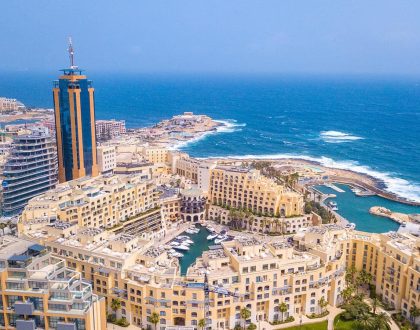Malta’s Film Industry – Taxpayer-Funded Productions

In the world of cinema, the allure of exotic locations often adds a magical touch to the visual narrative. Malta, with its stunning landscapes and historic sites, has emerged as a sought-after destination for filmmakers seeking captivating backdrops. However, what might surprise many is the extent to which the Maltese government has opened its coffers to incentivize film and television productions to choose the island as their filming location.
Malta’s Generous Cash Rebate Scheme
The concept is simple yet powerful: offer financial incentives to production houses that decide to shoot their films or TV series in Malta. This strategy, known as a cash rebate scheme, involves providing a percentage of the production’s expenditure back to the filmmakers. In Malta’s case, the government offers an impressive cashback of up to 40%, effectively reducing the financial burden of creating cinematic masterpieces on the island.
This initiative has not only attracted a diverse range of productions to Malta’s shores but has also raised eyebrows due to the substantial sums involved. The logic is straightforward – by providing substantial financial incentives, the Maltese government hopes to create a win-win situation for both the local economy and the global film industry.
Figures and Commitments
Official figures, recently published on the European Commission’s State aid website, shed light on the magnitude of Malta’s investment in its film industry. The Malta Film Commission, entrusted with overseeing the process, has granted or committed to provide an astonishing €142,701,104 to production houses between 2019 and August 2023. And with the year far from over, this figure is predicted to surge beyond the €150 million mark.
Noteworthy among these allocations is Gladiator 2, set to receive nearly €47 million after its completion. This record-breaking amount underscores the scale of investment the Maltese government is willing to make to attract high-profile productions to its shores.
Successes and Controversies
While some productions have undoubtedly reaped the benefits of Malta’s cash rebate scheme, not every venture has met with unbridled success. The Last Voyage of the Demeter, a film narrating the harrowing tale of a merchant ship attacked by Dracula, stumbled during its premiere weekend. Industry insiders have questioned the efficacy of such films in promoting Malta as a tourist destination. The fate of this film raises pertinent questions about the extent to which cinematic ventures can influence perceptions and drive tourism.
On the flip side, productions like Jurassic World, which showcased parts of Malta in 2020, highlight the potential symbiosis between the film industry and tourism. The fact that Malta allocated a little over €5 million in taxpayers’ money to this production reflects the government’s belief in the returns generated by such investments.
Reality TV and Rebates
Beyond the silver screen, Malta’s cash rebate scheme has extended its embrace to the realm of reality TV. Shows like Are You The One, True Love or True Lies, and Below Deck Mediterranean have capitalized on the island’s scenic beauty to create compelling narratives of love and intrigue. These productions, with their unique twists on the theme of relationships, have received significant funding through the cash rebate scheme.
For instance, Are You The One was granted close to €1 million, while Below Deck Mediterranean and True Love or True Lies each secured more than €700,000. The fact that these shows have found their way to Malta’s shores speaks volumes about the island’s appeal as a backdrop for various genres of entertainment.
Evolution of the Rebate Scheme
Malta’s journey into the realm of film incentives dates back to 2005 when the cash rebate scheme was first introduced. Over time, the Maltese government recognized the potential of this initiative to transform the local film industry and the economy at large. In 2019 and again in the following year, the allocation of funds to foreign film companies saw a significant boost, signaling Malta’s ambition to become a prominent destination for cinematic productions.
Industry Perspectives
Opinions within the industry regarding Malta’s cash rebate scheme are both varied and complex. Prominent filmmakers and insiders acknowledge the benefits of financial incentives, citing their potential to catalyze the industry’s growth. However, concerns loom large over the distribution of taxpayer money to foreign production houses, some of which belong to major players in the film industry.
While the Maltese government has defended its strategy, emphasizing the injection of millions of euros into the local economy, questions persist about the efficacy and transparency of the process. As industry professionals deliberate over the future of the rebate scheme, it becomes evident that striking a balance between financial incentives, cultural enrichment, and local industry growth is a nuanced challenge.
Sustainability and Cultural Value
As Malta’s cash rebate scheme evolves, the question of its sustainability becomes increasingly important. Industry insiders have drawn comparisons with other countries that also offer film incentives, each with its own cap on the amount allocated. Italy, Spain, France, and Greece have implemented rebate caps ranging from €12 million to €30 million, highlighting the diversity of approaches taken globally.
Furthermore, concerns have been raised about the cultural value generated by these incentivized productions. While financial benefits are clear, the extent to which these films contribute to Malta’s cultural identity and foster a thriving local film industry warrants thorough examination.
Uncertain Funding and Government Plans
Uncertainties linger around the source of funds for Malta’s cash rebate scheme. The government’s plans to allocate a specific budget for film incentives have faced challenges, as the allocated funds have already exceeded the planned amount. With €19 million surpassing the initial cap, the future funding for the rebate scheme remains uncertain.
As the Maltese film industry navigates these complexities, the balancing act between financial investment, cultural preservation, and economic growth continues. The journey ahead will demand strategic foresight, collaboration, and a holistic approach to ensure that Malta’s film industry thrives while the nation’s interests are safeguarded.
Conclusion
The allure of Malta’s landscapes and historical sites has seamlessly blended with the magic of cinema, enticing productions from around the world to choose the island as their backdrop. Malta’s cash rebate scheme, a key driver in this endeavor, has garnered attention for its generosity and the financial investments it has attracted.
From blockbusters to reality TV, the productions that have benefited from this scheme showcase the diverse appeal of Malta’s locations. Yet, challenges persist, ranging from the effectiveness of film promotion to questions about the equitable distribution of funds. As Malta’s film industry continues to evolve, striking the right balance between incentives, cultural enrichment, and industry growth remains a pivotal task.
FAQs
Is the cash rebate scheme unique to Malta?
The concept of cash rebate schemes exists in various countries, each tailored to their film industry’s needs and economic goals.
How are the funds for the rebate scheme allocated?
The funds for the cash rebate scheme are allocated by the Malta Film Commission, which evaluates and approves eligible productions.
Are local productions also eligible for the cash rebate?
Yes, Maltese productions and co-productions between Maltese and foreign producers can also benefit from the rebate scheme.
How does the cash rebate scheme impact the local economy?
Proponents argue that the scheme injects funds into the local economy and generates economic activity through various channels.
What challenges does Malta’s film industry face in the future?
The industry faces challenges related to sustainability, cultural value, and the equitable distribution of funds to foreign productions. The balancing act between growth and cultural preservation remains ongoing.
Recommended Posts

Malta’s SMEs Concerns Over Economy
October 27, 2023

Malta – €52 Million Deficit in 2023
October 27, 2023

Court criticism of Prime Minister
October 26, 2023
